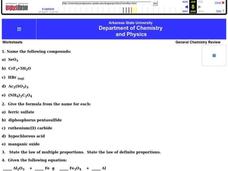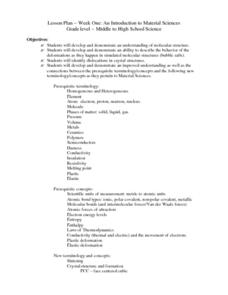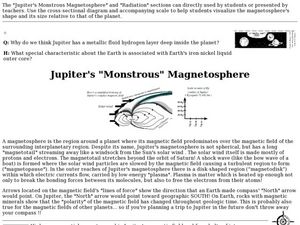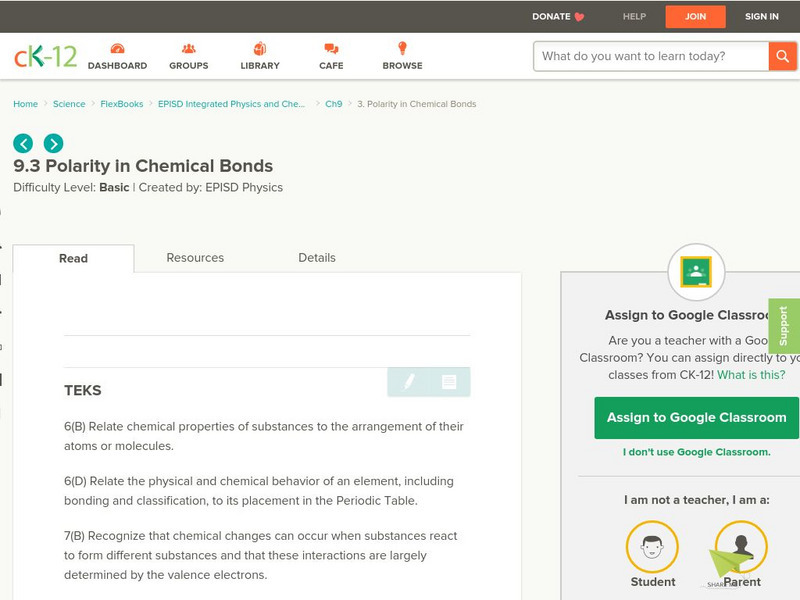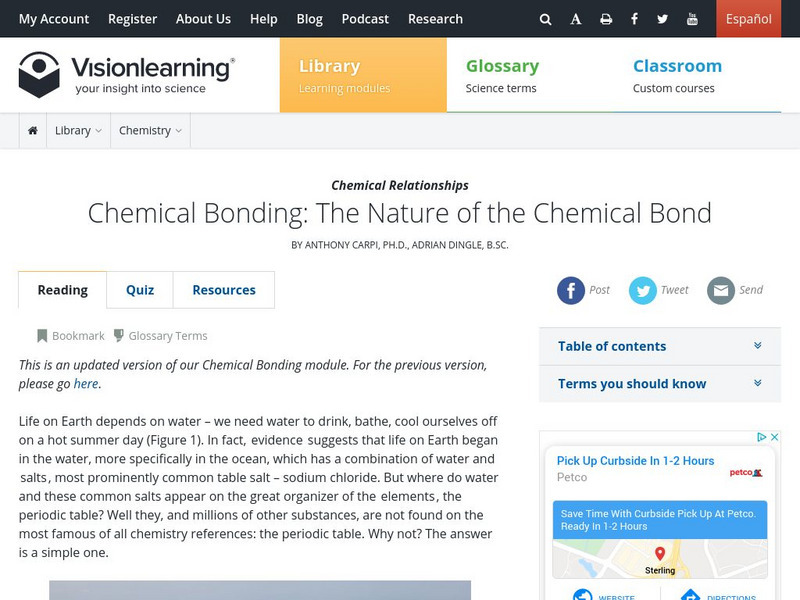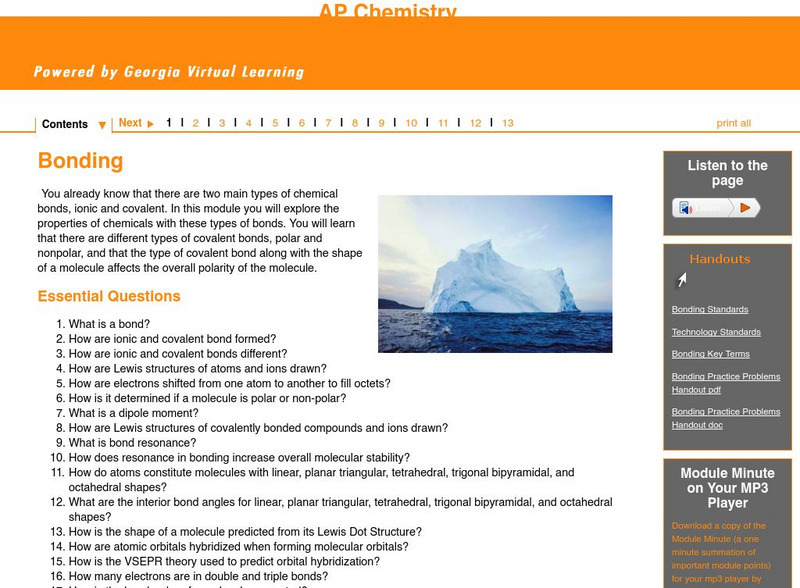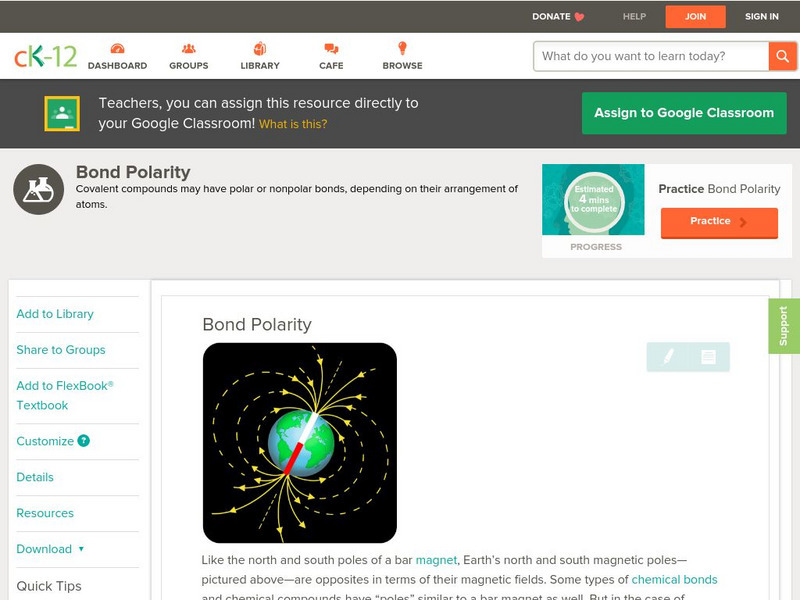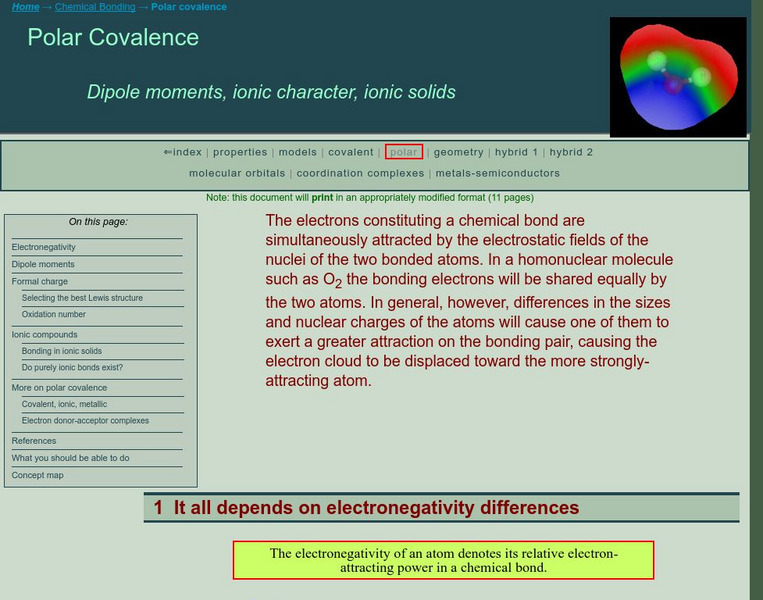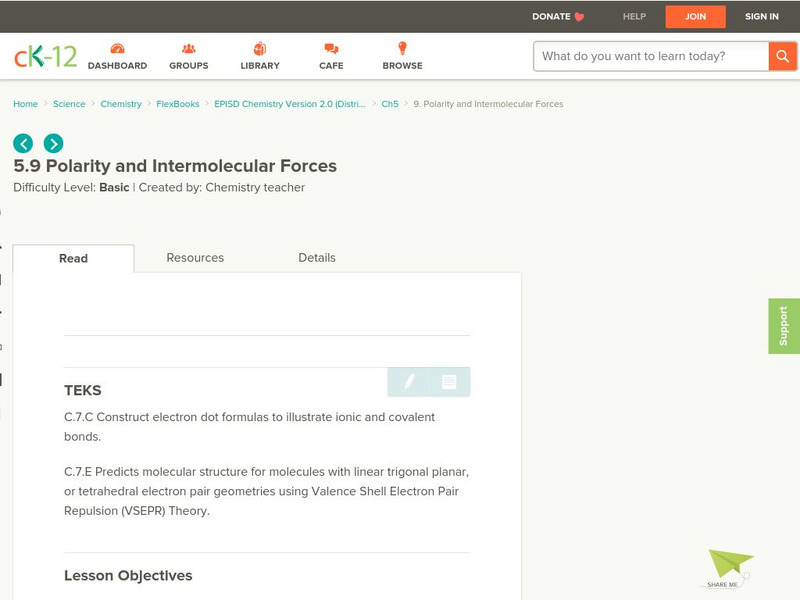Curated OER
Physical and Chemical Properties of Water
Students experiment with water as a component of suspensions, solutions, and heat conduction contributing to the use of food and the health and wellness of human beings.
Curated OER
The Chemistry of Life
In this chemistry of life worksheet, students will review key terms of plant cell structure and chemistry by reading 13 clues to complete the puzzle. Word bank is included.
Curated OER
Molecular Structure of Proteins
Students examine the effects different substances have on proteins. They test different molecules reaction to water. They discover how the amount of water affects the shape of the protein.
Curated OER
Chemical Compounds
In this chemical compounds worksheet, students write the name of compounds from their chemical formula, balance equations, write electronic configurations for elements, and draw Lewis dot structures. This worksheet has 8 fill in the...
Curated OER
Chemistry 1A Review
In this Chemistry 1A worksheet, students review, molecular weight, solubility, endothermic reactions, and number of protons, neutrons, and electrons for elements. Students review Lewis Structures and how to predict the amount of product...
Curated OER
An Introduction To Material Sciences
Students investigate the concept of molecular structure. They describe the behavior of simulated molecules and identify any dislocations in crystalline structures. They also define various related vocabulary words and use them in...
Curated OER
Jupiter's "Monstrous" Magnetosphere
Students explore Jupiter's magnetosphere. In this Jupiter lesson, students examine a diagram of the magnetic field that surrounds Jupiter.
CK-12 Foundation
Ck 12: Polarity in Chemical Bonds
[Free Registration/Login may be required to access all resource tools.] Students will determine the polarity of a chemical bond using the electronegativity chart, and then distinguish between nonpolar covalent, polar covalent, and ionic...
Ohio State University
Ohio State University: Electronegativity & Bond Polarity
Excellent graphics help this page explain the relationship between electronegativity and bond polarity.
Other
Chemguide: Electronegativity
This page explains what electronegativity is, and how and why it varies around the Periodic Table. It looks at the way that electronegativity differences affect bond type and explains what is meant by polar bonds and polar molecules.
Concord Consortium
Concord Consortium: Stem Resources: Chemical Bonds
By working through this web-based activity, students differentiate between ionic, non-polar covalent, and polar covalent bonds. Specifically, distinctions are made between bonding types based on orbital shapes and electronegativity...
Vision Learning
Visionlearning: Chemistry: The Nature of the Chemical Bond
This site talks about ionic, polar covalent, and non-polar covalent bonding.
Khan Academy
Khan Academy: Single and Multiple Covalent Bonds
Explains what covalent bonds are and the difference between them and ionic bonds. Discusses the properties of polar and non-polar covalent bonds, and single and multiple covalent bonds, and gives analogies and examples of how covalent...
Georgia Department of Education
Ga Virtual Learning: Ap Chemistry: Bonding
In this module students explore the properties of chemicals with covalent and ionic bonds. Students learn that there are different types of covalent bonds, polar and nonpolar, and that the type of covalent bond along with the shape of a...
Simon Fraser University
Chem1 Virtual Textbook: Chemical Bonds: Covalent or Ionic or What?
Use this resource to understand polar covalence in ion-derived solids.
University of Colorado
University of Colorado: Ph Et Interactive Simulations: Molecule Polarity
An interactive simulation that teaches about polarity, electronegativity, and bonds by changing the electronegativity of atoms and bond angles in a molecule to see how it affects polarity. This simulation can either be downloaded or...
Concord Consortium
Concord Consortium: Molecular Workbench Showcase: Chemistry, Chemical Bonds
Simulations to show students the nature of chemical bonds. Simulations include an explanation of stereochemistry, atomic orbitals, chemical polarity, formation of an atom, and a summary quiz.
University of Colorado
University of Colorado: Ph Et Interactive Simulations: Molecule Polarity
When is a molecule polar? Change the electronegativity of atoms in a molecule to see how it affects polarity. See how the molecule behaves in an electric field. Change the bond angle to see how shape affects polarity. See how it works...
PBS
Pbs Learning Media: Covalent Bonding
This interactive activity from ChemThink takes a closer look at a covalent bond: how it is formed and how the sharing of two electrons can keep atoms together.
CK-12 Foundation
Ck 12: Physical Science: Bond Polarity
[Free Registration/Login may be required to access all resource tools.] Polarity and covalent bonds.
Simon Fraser University
Chem1 Virtual Textbook: Polar and Nonpolar Bonds
The General Chemistry Virtual Textbook, or Chem 1, is broken into several sections covering various aspects of topics related to chemistry. This section deals with chemical bonding and specifically the study of both polar and nonpolar...
CK-12 Foundation
Ck 12: Polarity and Intermolecular Forces
[Free Registration/Login may be required to access all resource tools.] The following online tutorial describes how the electronegativity difference between two atoms in a covalent bond results in the formation of a nonpolar covalent,...
Frostburg State University
General Chemistry: Why Oh, Nh, and Fh Bonds Are Polar
Frostburg State University provides a brief explanation to the question of why small hydrogen molecules, such as OH, NH, and FH, are very polar.
Michael Blaber, PhD
Fsu: Basic Concepts of Chemical Bonding: Polarity and Electronegativity
Florida State University provides an explanation of electronegativity of elements and its affect on bond type.



